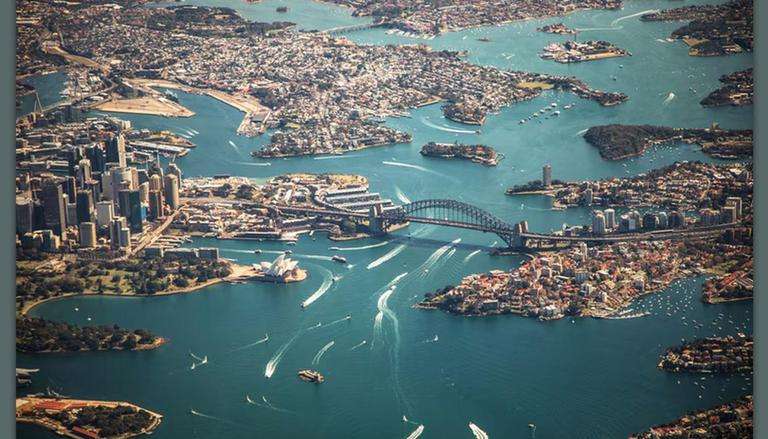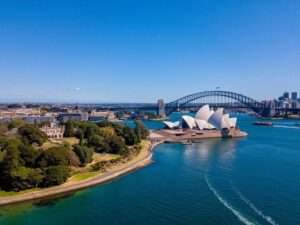
Things to Consider Before Moving to Australia. Australia is generally regarded as one of the world’s safest and most fulfilling places to live. It’s no surprise that this continent is so popular with ex-pats, with a reputation for pleasant and calm people, strong industries, superb schools, a multicultural ambiance, and some of the world’s most diverse and varied settings. Yes, Australia is a continent, with a total area of 7.692 square kilometers, approximately the same as America’s 48 contiguous states.
Australia is divided into two territories, the Capital Territory and the Northern Territory, as well as six states. Because of its long isolation from the rest of the globe, it has unusual fauna and scenery that are unlike anything else on the planet. Perhaps it is because of this that its residents have such a great passion for outdoor activities, making it ideal for nature lovers and adventurers migrating Downunder.
It’s also home to the world’s oldest civilization, with Australian Aborigines dating back over 70 thousand years. The country’s rich, if tainted, past coexists with its agricultural and metropolitan identities. Australia has a lot to offer in terms of history, culture, farming, art, cuisine, business, and creatures with pockets for holding their young.
To work in Australia, the majority of non-citizens will require a visa. If you don’t have a job offer (in which case your company is likely to assist you with the visa procedure), Australia has a list of skilled jobs that highlight areas of work where they are seeking expressions of interest from possible immigrants. There are a variety of visas available in Australia that will allow you to live and work there.
This includes two types of Employer-Sponsored Workers, Business visas for individuals who own businesses or are looking to invest, and various Skilled worker visas for those who work in sectors where talents are in short supply. Keep in mind that if you have a sponsored visa, you will be obligated to work for that company for the duration of your stay.
The Working Holiday Visa is a popular option for young individuals from qualified countries who want to spend a year in Australia. The visa application procedure is generally conducted online, and depending on the type of visa you are applying for, you will be required to provide papers (as might your employer). To begin your application and keep track of its progress, create an ImmiAccount.
Because of its unique environment and flora and fauna, Australia has enacted several import restrictions to conserve its biodiversity. Food, plant material, animals, and animal products are all heavily regulated, and quarantine may be necessary. Plants, fruit, agricultural machinery, animals, and recreational equipment are all subject to restrictions while moving across states.
Fortunately, the Australian government’s website contains information on customs regulations to assist you. Links will assist you in importing your cargo, but if there is anything on the plane with you that you are unsure about, disclose it. Bringing in forbidden items or failing to comply with quarantine regulations carries a severe penalty.
Finance, Business Consultation, Metals and Minerals, Energy, Industrial, and Healthcare are Australia’s leading industries. There is also a sizable agriculture industry, which is claimed to contribute roughly 38% of worldwide market solutions through information technology.
Because is such a large continent, the area and city you choose will frequently be determined by the type of work available. At the moment, the key cities fueling Australia’s economy are Sydney and Melbourne. Sydney and Melbourne are good places to look for opportunities in professional services, finance, and information technology. Canberra also boasts a thriving IT sector. Perth and Adelaide are major participants in the mining industry (as well as manufacturing and construction), but Brisbane and Melbourne are also worth investigating.

At the end of 2016, full-time earnings averaged AUD$78,832 per year. Financial Services, Information, Utilities, Professional and Technical Services, and Education were among the highest-paying industries, with an average salary of $139,303. At the start of 2018, the minimum wage was $18.29 per hour.
If you’re still looking for a job in another country, the good news is that many organizations will conduct a Skype interview. There are also several recruiting companies in Australia that you might contact before moving to see if they can assist you in finding a job, depending on your industry. Use online search sites such as Seek, Indeed, and Jobseeker to do your own search.
Also Read: Guides on Moving Abroad for Future Expats
Despite the fact that there is no official language, English is the de facto spoken language (albeit with distinctive accents and its own dialects). However, because Australia has become a rather multicultural society, there is a very high number of bilingual migrants. According to the 2016 Census, 30% of households spoke more than one language, with Mandarin, Cantonese, Vietnamese, and Italian being the most popular languages after English. Around 15 indigenous Aboriginal languages are spoken throughout the country.
The cost of living varies by city, and the average cost of living in Australia can be fairly high. Australia’s most expensive city, Sydney, is placed 42 on the cost of living index scale, making it appealing to individuals looking to relocate to the Asia-Pacific area. On average, the monthly rent would cost between $2,850 and $2,190, and groceries and food will cost between $100 and $280. On Numbeo, you may get more detailed estimations of living costs.
There are 53 banks in Australia, 14 of which are owned by the government. The banking system is considered to be fairly solid, and with finance accounting for a large portion of Australia’s economy, you can anticipate competent services. Australia and New Zealand Banking Group, National Australian Bank, Westpac, and AMP Bank Ltd are all well-known. Before you create an account in Australia, talk to your present bank to see if they have any recommendations or affiliates (or their own branch). The Commonwealth Bank is an international bank that has offices in Australia, as do Citibank and HSBC.
If you need to send money abroad, well-known businesses such as OFX, Transferwise, and Western Union provide dependable services at reasonable rates. Check with your bank first to see if they have any advice or solutions. Take a look around.
The progressive tax system in Australia spans from 19 percent to 45 percent for various tax categories. For Australian residents, the first $18,200 of income is tax-free, but this does not apply to international residents. A 2% surcharge is also levied, which goes toward the Medicare healthcare system. In most cases, your employer will deduct tax from your pay automatically. The Australian government’s website contains useful tax information, including instructions on how to file your tax return. The easiest ways to pay are through credit or debit card or online using their BPAY system.
With a population of 24.13 million people and a landmass of approximately 8 million square kilometers, a little forethought about where you wish to live can be beneficial. The region contains everything from beautiful beaches to the desert outback, so it’s crucial to consider what kind of lifestyle you want. Most of Australia’s major cities have a high standard of living and enough to offer in terms of entertainment, culture, education, and outdoor activities — Melbourne, Sydney, Brisbane, Adelaide, and Perth are popular choices for ex-pats.
It’s also worth noting that Melbourne has been named the world’s most livable city. Naturally, your profession may have a role in where you live, so take a look at the list above and conduct some research before making a decision.
In Australia, good houses sell quickly, so start looking for a home as soon as you know where and when you’ll be relocating. It’s best to start looking at least two weeks ahead of time, however it doesn’t hurt to start looking earlier. Keep in mind the size of your city as well; if you plan on looking for a place once you’ve arrived, you’ll need to account for the time it takes to commute between different areas. Make sure you know what you’re looking for and weigh in things like commute time, neighborhood, and schools. com.au, Domain, and Property.com.au are all good whether you’re looking to rent or buy, and Rent.com.au can help you with your rental search.





